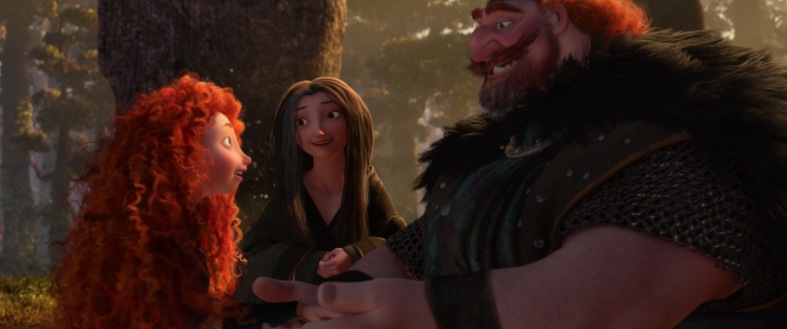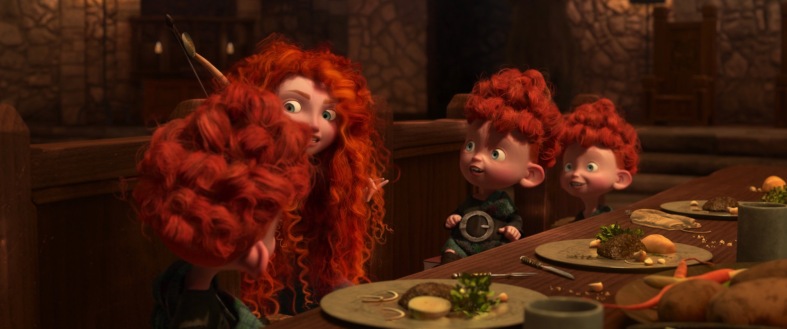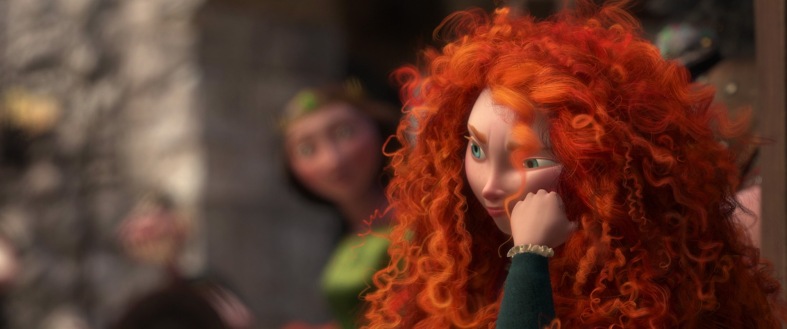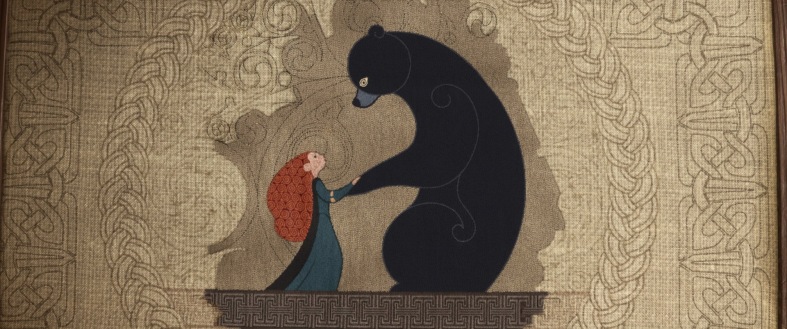
Last week, we talked about masculinity in Brother Bear, and how the movie manages to have a sincere discussion about masculinity without making a joke out of the whole thing.
This week, in honour of Mother’s Day, we’re going to talk about Brave – which is just as much about womanhood as Brother Bear is about manhood, and, inexplicably, also just as much about bears.
Brave is generally considered to be a Pixar dud, which we think is unfair for our own specific reasons, as well as our more general bias about Pixar films. We like them, don’t get us wrong (excepting the Cars franchise), but while Brave may not have the cleanest plot like some others we could mention, its underlying themes work for us way more than those of some of Pixar’s biggest hits. Mother-daughter relationships, a coming-of-age story that’s realistically about coming-of-age, and the underlying importance of family do it for us. Toys in existential crises about children growing up… don’t.
But we can’t argue that the film doesn’t suffer from story problems. It’s pretty obvious. It had trouble while it was in development with it’s director and writer, Brenda Chapman, fired in the middle of production for creative differences. Erm, who is a sucker for behind-the-scenes stuff, watched everything she could find on the making of this movie and came away still none the wiser about what specifically went wrong, but that’s OK. We’d rather engage with the movie as it is than try to critique the movie it might have been. Let’s start by defending it against some of the more dubious complaints we’ve heard.
Number One: Merida shouldn’t complain/make selfish and irresponsible decisions. Her complaining about being forced into marriage and wanting her freedom is invalid because every once in a while she doesn’t have to be a princess, and also she’s privileged.
Being forced to get married is a good enough reason to do something rash, when you’ve tried arguing and you’re not being listened to. And this is true no matter how privileged you are or how often you get days off.
Number Two: Bears.
Yes.
Number Three: The male characters are exclusively used for comic relief.
… so?
Female characters are typically used only for certain things, like love interests, prizes, goals, villains, temptresses, or simply as naked, dying, or dead bodies. Forgive us if we’re not concerned that the men in this movie are not as integral to the story as Merida and Elinor are – because that’s all that’s happening. The male characters are important, if mostly good for a giggle, and there’s genuine warmth to Fergus at least.
Number Four: Exploitative of Scottish people.
We don’t want to be insensitive because there are certainly some stereotypes here and some jokes that didn’t need to be included. We’ve all seen Pixar movies, yes? We know they’re capable of being smart. Making a joke that is ultimately, “Haaaaaaaaaa Scottish people are Scottish” is beneath their creative capabilities.
But.
Having seen the behind-the-scenes footage we know that there was a lot of research put into this, and it seems as though the filmmakers went into it with a lot of respect. This isn’t the Siamese cats or the black crows or Peter Pan’s Indian tribe. It isn’t even like Aladdin, where the characters and setting are vaguely Middle Eastern but the actors are all white people, who occasionally put on accents. These are lovable, fleshed out characters playing on a beautifully crafted stage, played by Scottish actors. So apart from everyone’s tendency to have cheap laughs at kilts and haggis, we’d argue that the film is for the most part respectful.
The unique things we love about Brave
Mothers, Daughters, Families
Brave is the only Disney or Pixar fairy tale about a family. Everyone loves to complain that each Disney fairy tale hero is missing at least one parent, but Brave is the fairy tale movie that breaks the rule.


Not only does Brave tell a story about a family that starts together and ends together, which, if you think about it, only makes sense in a genre intended for all ages, but it is the only example we can think of for a fully Mother-Daughter narrative in animation.
Forget animation, actually. While we aren’t entirely lacking mother-daughter films, the ones we can think of that we’d recommend are sparse: Divine Secrets of the Ya-Ya Sisterhood, One True Thing, Dolores Claiborne, Mermaids, Stepmom, and Freaky Friday. Maybe this is because we need to be watching different movies, but stories about mothers and daughters seem to be in short supply.
Divine is an emotional roller-coaster – worth the ride, but we relate to that Jann Arden song “Good Mother” so while we very much like the movie, it doesn’t get under our skin like Brave does.
One True Thing and Stepmom are about dying mothers, which is a different thing.
Dolores Claiborne is amazing, but it’s more about women than it is about mothers and daughters. Also it’s horrifying.
Mermaids has a lot of angst going on, and someone makes a choice later on in the film with major familial consequences, so it’s a similar story to Brave.
Freaky Friday is the ONLY truly lighthearted one! It’s similar to Brave in its suitability for younger audiences, its exploration of a mother-daughter relationship where they both learn to empathize with each other and communicate properly, and again, angst.
Now there’s at least a smidgen of romance in each of these, except Dolores Claiborne, which again is more about women than it is about mothers and daughters. Brave’s lack of romance means that Merida and Elinor can focus 100% on their relationship with each other.
Like in Brother Bear, the transformation into a bear impedes communication between Elinor and Merida. However, in Brother Bear, it requires a magical transformation back into a human in order for Kenai and Denahi can work things out. In Brave, it’s while Elinor is a bear that she and Merida are able to communicate properly. Merida implores on several occasions for her parents, particularly Elinor, to listen to her, and they don’t. Although Fergus sees eye to eye with Merida on many more issues than Elinor does, it’s not from listening to his daughter, but from their similar personalities. In the climax of the film, he rides off to kill Bear!Elinor, and Merida shouts at him to listen – and he does not. It takes her standing in his way, twice, with weapons, to stop him. In Elinor’s case, their arguments frustrate her because she believes Merida doesn’t listen to her, but in this case “listen” does not mean effective communication, it means compliance with everything she asks her to do. Merida won’t do this, because she does not want to, quite rightly.
When Merida does her speech at the end, successfully ending the brawl without any help from Elinor, this is also Merida finally reaching out to her mother. Elinor, too, is finally listening. She sees Merida about to agree to her betrothal, and even though she can’t speak (or roar), she frantically mimes her way through the rest of the speech – and she and Merida communicate freely for the first time, despite all of their obstacles, and come to a compromise on how to handle the situation.
Ultimately in both films, the bear transformation is an effective metaphor for the challenges people have with communicating in these important relationships. In this movie, it was also the motivation for Merida and Elinor to finally effectively communicate.
Romance Does Not Exist
There was a time when Merida was to be the great lesbian hero of the Disney-Pixar world, but that time has passed and we’ve moved on to Elsa. It’s a good thing, too, because we are in dire need of at least one princess who isn’t interested in who she’s going to marry (or who she’s going to be romantically linked to, for those princesses who don’t decide to get married right away). Merida’s fixation on staying single, keeping her freedom, and her reiterations of, “I’m just not ready” and, of course, “In fact, [the princess] might not ever be ready,” suggest that she could be asexual, or aromantic, or both.

She does say later, during her pacifying of the Lords speech, that the Queen wants young people to be free to find love in their own time, but as we have learned from Disney movies of late (this one included), love comes in many more forms than just romantic love. In any case, here’s to Merida not getting married. Even though we all liked Young MacGuffin.
The dogs aren’t cute
We suspect they’re instead historically accurate. Which is nice.
The Coming-of-Age Story is more like what growing up actually is like

Obviously it’s not a completely realistic coming-of-age story, but Merida’s teenage angst and eye-rolling and stubbornness remind us of being teenagers more than Elsa’s character arc in Frozen, for example, or Simba’s in The Lion King. This is probably because some heavy stuff is happening to those characters, so the way they come of age is not going to resemble an ordinarily bumpy transition to adulthood. But Brave is refreshing because of this – despite (and because of) the magic happening around her, Merida has to grow up and take some responsibility.
Brave GETS how coming-of-age and mother-daughter relationships are linked for girls.
If you are a woman who grew up with a mother, at some point or another she probably taught you how to survive as a woman living in a man’s world. Whether we think it’s right or wrong, women have to operate within certain rules, or at least be aware of those rules when we purposefully go on to break them. We learn that from the female role models in our lives, and in Brave, Merida learns from Elinor.
In the throne room, the men get into a brawl. Elinor sends Fergus to deal with it, and he ends up resorting to violence when his attempts to pacify the men fail. Merida and her mother sit there, visibly fed up, as the men fight.
Elinor stands, and walks through the room. The men all stop and stare at her sheepishly. Merida looks up, visibly noticing the power her mother has at this moment.
The lesson here is simple, and familiar: Women are expected to repress every violent or emotional instinct. Men are not.
Elinor teaches Merida this lesson every day – her brothers get away with murder, she doesn’t get away with anything. A princess is a role model. A princess is compassionate. A princess does not chortle. A princess does not stuff her gob. A princess does not place her weapons on the table. A princess should not even have weapons, in Elinor’s opinion.
Before we get all up in arms like the clans here, let’s take a moment to consider whether the movie thinks this is right or wrong.
On one hand, yes, the movie does seem to believe Elinor. Look at what happens when the ladies do resort to violence – Merida hurts her mother by cutting the tapestry, and Elinor hurts Merida in kind by burning her bow.
On the other hand, although Merida is held responsible for nearly causing a war and turning her mother into a bear, she does eventually get what she wanted: Her freedom to break the Woman Rules.
Merida walks through the brawling men just like her mom. And when she can’t make them listen, she takes a note from Fergus, and screams, “SHUT IT.” And it works! Because Merida is not her mother, and she’s not a perfect princess. But she is a powerful, responsible young woman who is capable of simultaneously embracing her role as princess and breaking the rules that prevent her from being who she is- a wild-haired marksman who wants to stay single and let her hair flow in the wind as she rides through the glen firing arrows into the sunset.

The only problem we have: Bears.
We’re not really sure what’s going on with Mor’du. We understand that he is a legendary prince who ruined himself, his family, and his kingdom by being selfish, and by going to a bear-obsessed witch for help. But we also know that he’s behind the Wisps summoning Merida to the same fate, and later summoning her to mend her own bond and, conveniently, get Mor’du killed and free his spirit.
It seems kind of mean to trick a sixteen year old girl like that just to get a bear killed. Why didn’t he instead go after Fergus if he wanted the bear killed so badly? Was that what he was trying to do all along, but Fergus doesn’t believe in magic so he had to mess with his wife and daughter, who do?
And how is it that he’s both Mor’du and the power behind the Wisps? And why isn’t he just a regular bear? He should have lived out his lifespan by now if it really is an ancient kingdom as the legends say, and at least some of those wounds should have slowed him down. Why does he seek out people to savage and hang around his old throne-room when it’s implied that should Elinor remain a bear forever, she’ll just be a regular bear which will sever the bonds she has to her family?
When Elinor goes full bear she does become a danger to those around her. First, she attacks Merida, but only when Merida taps her on the back, which you would never want to do to a real bear for obvious reasons. Later she attacks Fergus, who is a real threat to her, but her interactions with Merida are fairly harmless. When she begins to lose herself for the final time, she just lays there letting Merida hug her until eventually she changes back. There isn’t a consistent metaphor about loss of humanity here, because we don’t have a clear definition of a binary. For example, with bear-Elinor’s violence, we only see it twice, and on two occasions we see her tolerate Merida’s presence, which means violence is not linked to the animal, with non-violence linked to the human, as it normally would be.
The only common thread is that bear-Elinor doesn’t know that she is Merida’s mother, or Fergus’s wife. And even this goes both ways: Fergus refuses to listen to Merida when she tries to explain to him that his wife has been transformed into a bear. Elinor remaining a bear is framed as being tragic not because she’ll be a vicious killing machine like Mor’du, but instead because she will lose her family, and her family will lose her.
That makes sense. We still think they could have portrayed this a little better.
We’re asked to take for granted Mor’du’s existence and actions and we suppose that we can – perhaps the bear-witch’s spell was a little bit different for the prince than it was for Merida. But the only information we’re given is that the witch is just inexplicably obsessed by bears, and every time someone asks her for a spell they do so in such a way that, happily, she can just perform the one spell she knows and everybody magics into bears.
We needed Sitka’s silent wisdom or something, so that we could understand what the significance of bears is in particular.
The only thing we can think of is the “mother bear” thing, and Elinor certainly fulfills this stereotype. As much as it’s Fergus who wants to revenge himself against Mor’du, it is ultimately Elinor who kills him, and she only does this to save her daughter.
Ultimately, our only problem with the movie is the bears. Even though it didn’t need to be bears, or they could have more thoroughly explained why it had to be bears, there’s enough depth in their use to excuse their presence in this film, excessive and confusing though it may be. Despite its flaws, this is the first Pixar film with a female lead. The second Pixar film with a female lead is Inside Out, and it’s worth noting that these two movies are also the only Pixar films with a story that would provide catharsis for the audience and not the creators. Not to knock Finding Nemo, The Incredibles, or Ratatouille, but these are stories about parent figures, special people, and prodigies. Although Brave (and Inside Out) has parent figures, the lesson is that they need to give their child room to grow and be themselves – and shouldn’t that be the entire point of children’s literature?





















This was well worth a read! Do you ever share these types of posts on any movie sites? 🙂
LikeLike
We’re glad you enjoyed our ramblings! No, for now we keep to our little corner of the internet 🙂
LikeLiked by 1 person
That’s cool! Well if you have any interest, let me know if you’d like to post on Moviepilot, I’d love to help you guys out! 🙂 samuel.harries@moviepilot.com
LikeLike
Hi! So…this is an old post, but I was just hopping about your blog because I love reading your posts on the princesses. This one is really insightful, and brings up lots of excellent points that never occurred to me. I also love Brave a great deal, so I’m happy to read a defense post of sorts.
Yes yes yes about how women have to live in a man’s world, and how Merida mirrors Elinor while still being herself when she just yells for everyone to shut up.
“In Elinor’s case, their arguments frustrate her because she believes Merida doesn’t listen to her, but in this case “listen” does not mean effective communication, it means compliance with everything she asks her to do. Merida won’t do this, because she does not want to, quite rightly.” Again, YES. A writer that I do enjoy reading came up with the “junior knows best” trope and how its gained traction in animated films, but he argues that its peak was in 2012 when Brave, HTTYD, and Hotel Transylvania were released. I think you’ve made a really valid point. I just don’t agree with junior knows best because the parents are being unreasonable in some way, and this sets up conflict and whatnot. Yadda yadda.
And about Mor’du (favorite character alert!), he did go after Fergus. And he took his leg. In the climax, Fergus wrongly believes he can take Mor’du with his bare hands but of course he can’t. No one can defeat Mor’du. This was the point I made when people were touting Merida as a “solution” to all those delicate Disney Princesses. She couldn’t defeat Mor’du. Neither could her father, the Bear King, or dozens of other ferocious men. Even Elinor in her bear form has to rely on that stone column crushing him to death. He’s just Too Powerful. All that ancient magic I think, which is why his story/history fascinates me so. He’s still trapped in that bear form and is still acting like a vicious killing machine rather than like a regular bear because he chose that fate for himself? Whereas Elinor was an unwitting victim. But Merida had to be taught a lesson, so the wisps chose her I guess. But it was also up to her to break Mor’du’s curse, because she did wrong by her family the same way he did. Only, she was able to reverse the damage. Freeing him freed Elinor. And I don’t think he’s the power behind the wisps. I think his spirit was just able to manifest as them. Apologies if I misunderstood the point you were actually making. And for this obnoxiously long comment.
LikeLike
“He’s still trapped in that bear form and is still acting like a vicious killing machine rather than like a regular bear because he chose that fate for himself? Whereas Elinor was an unwitting victim.”
Thank you!! That makes so much sense and we totally missed it. And no, you didn’t misunderstand, we just couldn’t figure out what was going on lol
LikeLiked by 1 person